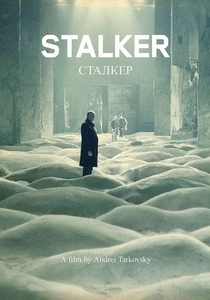Soviet cinema has left an indelible mark on the world of film, offering a unique perspective on the 20th century through its artful storytelling, social commentary, and historical narratives. This curated list of 10 Soviet films provides a window into the era's cultural, political, and social landscapes, showcasing the diversity and depth of Soviet filmmaking. Each film has been selected for its significance, its impact on cinema, and its availability in English dubbing or subtitles, making it accessible to a broader audience.

Stalker (1979)
Description: Directed by Andrei Tarkovsky, this philosophical sci-fi film explores themes of faith, human nature, and the search for meaning through the journey of three men into a mysterious "Zone" where wishes are granted.
Fact: The film was shot in Estonia, and the "Zone" was created using abandoned industrial sites. Tarkovsky's vision was so unique that it led to conflicts with Soviet censors.
 Watch Now
Watch Now 
Battleship Potemkin (1925)
Description: This silent film is a cornerstone of Soviet cinema, depicting the 1905 mutiny on the Russian battleship Potemkin. Its famous "Odessa Steps" sequence has become one of the most influential scenes in film history, showcasing the power of montage and editing.
Fact: The film was initially banned in the Soviet Union due to its revolutionary content but later became celebrated worldwide. It was also one of the first films to be preserved in the United States National Film Registry.
 30 Days Free
30 Days Free 
The Cranes Are Flying (1957)
Description: This poignant anti-war film tells the story of a young woman's life during World War II, capturing the emotional turmoil of love, loss, and survival. It won the Palme d'Or at the Cannes Film Festival, highlighting its universal appeal.
Fact: The film was one of the first Soviet films to openly criticize the war's impact on civilians, and its lead actress, Tatyana Samoilova, became an international star.
 30 Days Free
30 Days Free 
The Irony of Fate (1975)
Description: A beloved Soviet New Year's comedy, this film follows a man who, due to a series of hilarious misunderstandings, ends up in Leningrad instead of Moscow, leading to a romantic adventure. It's a staple of Russian holiday viewing.
Fact: The film has become a tradition in Russia, with many families watching it every New Year's Eve. It was also remade in
 30 Days Free
30 Days Free 
The Diamond Arm (1968)
Description: A classic Soviet comedy about a man who unwittingly becomes involved in a smuggling operation after receiving a cast with diamonds hidden inside. It's known for its humor and memorable characters.
Fact: The film's catchphrases have become part of everyday Russian language, and it's one of the most quoted films in Russian cinema.
 30 Days Free
30 Days Free 
The Dawns Here Are Quiet (1972)
Description: This war drama focuses on a group of female anti-aircraft gunners during World War II, showcasing their bravery and the harsh realities of war. It's a poignant tribute to the women who fought.
Fact: The film was based on a novel by Boris Vasilyev, and its success led to a remake in
 30 Days Free
30 Days Free 
The Ascent (1977)
Description: Set during World War II, this film follows two Soviet partisans on a mission that turns into a harrowing journey of survival and moral choices. It won the Golden Prize at the 10th Moscow International Film Festival.
Fact: The film's stark black-and-white cinematography and intense performances earned it international acclaim, including a nomination for the Academy Award for Best Foreign Language Film.
 30 Days Free
30 Days Free 
The White Sun of the Desert (1970)
Description: A mix of action, comedy, and drama, this film tells the story of a Red Army soldier who, after the Civil War, finds himself in a remote desert town, dealing with bandits and a harem of women.
Fact: It's often watched by cosmonauts before space missions for good luck, and its theme song is one of the most recognized in Russian culture.
 30 Days Free
30 Days Free 
Moscow Does Not Believe in Tears (1980)
Description: This melodrama spans three decades, following the lives of three women as they navigate love, career, and the changing Soviet society. It won the Academy Award for Best Foreign Language Film.
Fact: The film was initially criticized for its portrayal of Soviet life but later became a cultural phenomenon, reflecting the era's social changes.
 30 Days Free
30 Days Free 
The Mirror (1975)
Description: Andrei Tarkovsky's deeply personal and poetic film intertwines memories, dreams, and historical events, reflecting on the human condition and the passage of time.
Fact: The film was initially met with mixed reactions due to its non-linear narrative but has since been recognized as a masterpiece of world cinema.
 30 Days Free
30 Days Free 








